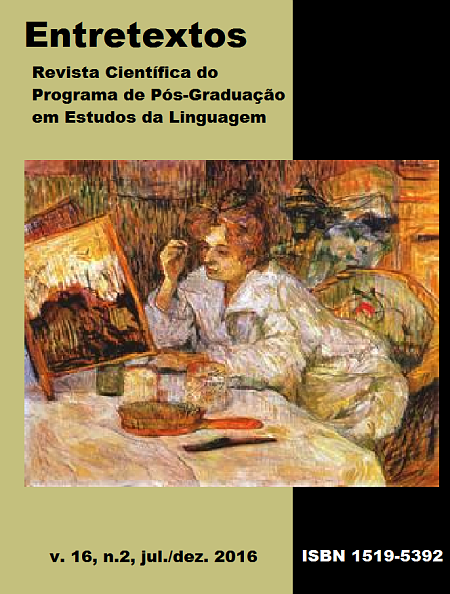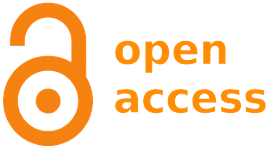A formação crítica de alunos e professores de inglês: uma relação entre escrita, argumentação e letramento crítico
DOI:
https://doi.org/10.5433/1519-5392.2016v16n2p127Palabras clave:
Letramento crítico, Argumentação, Process writingResumen
Como professores e pesquisadores, pretendemos promover a formação crítica dos alunos da nossa universidade por meio do ensino de línguas. Ao almejar essa formação, tentando não prejudicar o desenvolvimento das habilidades linguísticas, decidimos conduzir uma pesquisa-ação (BURNS, 2009) para compreender os processos de argumentação escrita e da formação crítica. Brydon (2010), Duboc (2012) e Jordão (2013) norteiam nosso estudo com relação ao letramento crítico, enquanto fundamentamo-nos principalmente em Liberali (2009) e Harmer (2007) para escrever sobre argumentação e escrita. Coletamos os dados por meio de anotações da professora observadora, dos textos escritos pelos alunos e dos planos e diários de aula. A interpretação de dados revelou que o processo de desenvolvimento da argumentação se fez mais relevante que uma possível adesão recorrente dela, contribuindo melhor para a formação crítica. Além disso, combinar docência com pesquisa resultou em reflexões que poderão ocasionar mudanças em nossas práticas docentes.Descargas
Citas
BRASIL. Ministério da Educação. Secretaria de Educação Básica. Orientações Curriculares para o Ensino Médio: Linguagens, códigos e suas tecnologias. Brasília, 2006. Disponível em: http://portal.mec.gov.br/seb/arquivos/pdf/. Acesso em: 1 mar. 2015.
BROWN, Douglas H. Teaching by principles: an interactive approach to language pedagogy. New York: Prentice Hall, 1994.
BRYDON, Diana. Critical literacies for globalizing times. Critical Literacies: Theories and Practices. v. 4, n. 2, p. 16-28, 2010. Disponível em: http://criticalliteracy.freehostia.com/index.php?journal=criticalliteracy&page=. Acesso em: 3 mar. 2015.
BURNS, Anne. Action research in second language teacher education. In: BURNS, Anne; RICHARDS, Jack C. (Ed.). The Cambridge guide to second language teacher education. New York: Cambridge University, 2009.
CERVETTI, Gina.; PARDALES, Michael J.; DAMICO, James S. A tale of differences: Comparing the traditions, perspectives, and educational goals of critical reading and critical literacy. Reading Online, v. 4 n. 9, 2001. Disponível em: http://www.readingonline.org/articles/art_index.asp?HREF=/articles/. Acesso em: 28 fev. 2014.
DEPARTMENT OF EDUCATION TASMANIA. School Education Division. English Learning Area: Critical literacy. 2004. Disponível em: . Acesso em: 11 fev. 2014.
DUBOC, Ana Paula Martinez. Atitude curricular: letramentos críticos nas brechas da formação de professores de inglês. 2012. 258 f. Tese (Doutorado em Letras) - Faculdade de Filosofia, Letras e Ciências Humanas, Universidade de São Paulo, 2012.
DUCROT, Osvald. O dizer e o dito. Revisão técnica da tradução Eduardo Guimarães. Campinas, SP: Pontes, 1987.
GALINARI, Melliandro Mendes. Logos, ethos e patos: "três lados" da mesma moeda. Alfa: revista de linguística, São José Rio Preto, v. 58 n. 2, jun./dez. 2014. Disponível em: http://www.scielo.br/scielo.php?pid=S1981-57942014000200257&script=sci_arttext. Acesso em: 3 mar. 2015.
HARMER, Jeremy. The Practice of English Language Teaching. 4th ed. Harlow: Pearson Longman, 2007.
JORDÃO, Clarissa Menezes. Abordagem comunicativa, pedagogia crítica e letramento crítico - farinhas do mesmo saco? In: HILSDORF ROCHA, Cláudia; FRANCO MACIEL, Ruberval. (Org.). Língua estrangeira e formação cidadã: por entre discursos e práticas. Campinas: Pontes Editores, 2013. p. 69-90. (Coleção Novas Perspectivas em Linguística Aplicada, v. 33).
KROLL, Barbara. Considerations for teaching an ESL/EFL course. In: LARSENFREEMAN, Diane; CELCE-MURCIA, Marianne. (Ed.). Teaching English as a second or foreign language. 3 rd Ed. Boston: Heinle & Heinle, 2001. p. 219-232.
LIBERALI, Fernanda Coelho. Creative Chain in the Process of Becoming a Totality. Bakhtiniana, São Paulo, v. 1, n. 2, p. 100-124, 2009.
MCLAUGHLIN, Maureen; DEVOOGD, Glenn. Critical Literacy as Comprehension: Expanding reader response. Journal of Adolescent and Adult Literacy, v. 48, n. 1, p. 52-62, 2004. Disponível em: http://www.jstor.org/stable/40012284. Acesso em: 18 jul. 2010.
OXFORD, Rebecca L. Language Learning Strategies: What every teacher should know. Boston: Heinle & Heinle, 1990.
RAJAGOPALAN, Kanavillil. Por uma linguística crítica: linguagem, identidade e a questão ética. São Paulo: Parábola Editorial, 2003. (Coleção Lingua[gem.]).
REBOUL, Olivier. Introdução à retórica. Tradução de Ivone Castilho Benedetti. São Paulo: Martins Fontes, 2004.
SÃO PAULO (SP). Secretaria Municipal de Educação. Caderno de orientações didáticas para EJA Língua Estrangeira - Inglês: etapas complementar e final. São Paulo: SME, DOT, 2010.
SCRIVENER, Jim. Learning Teaching. Oxford: Macmillan, 1994. SEOW, Anthony. The writing process and process writing. In: RICHARDS, Jack C; RENANDYA, Willy A. (Ed.). Methodology in language teaching: an anthology of current practice. New York: Cambridge University Press, 2002. p. 315-320.
STREET, B. What's 'new' in new literacy studies? Critical approaches to literacy in theory and practice. Current Issues in Comparative Education, v. 5, n. 2, p. 77-91, 2003.
SYLVESTER, C. Development Studies and Postcolonial Studies: Disparate tales of the "Third World." Third World Quarterly, v. 20, n. 4, p. 703-721, 1999.
TOULMIN, Stephen. The uses of argument. 1958. Cambridge: Cambridge University, 2003.
Descargas
Publicado
Cómo citar
Número
Sección
Licencia
Derechos de autor 2016 Entretextos

Esta obra está bajo una licencia internacional Creative Commons Atribución 4.0.
Entretextos adota a Licença Creative Commons Attribution 4.0 International, portanto, os direitos autorais relativos aos artigos publicados são do/s autor/es.
Sob essa licença é possível: Compartilhar - copiar e redistribuir o material em qualquer suporte ou formato. Adaptar - remixar, transformar, e criar a partir do material, atribuindo o devido crédito e prover um link para a licença e indicar se mudanças foram feitas.























